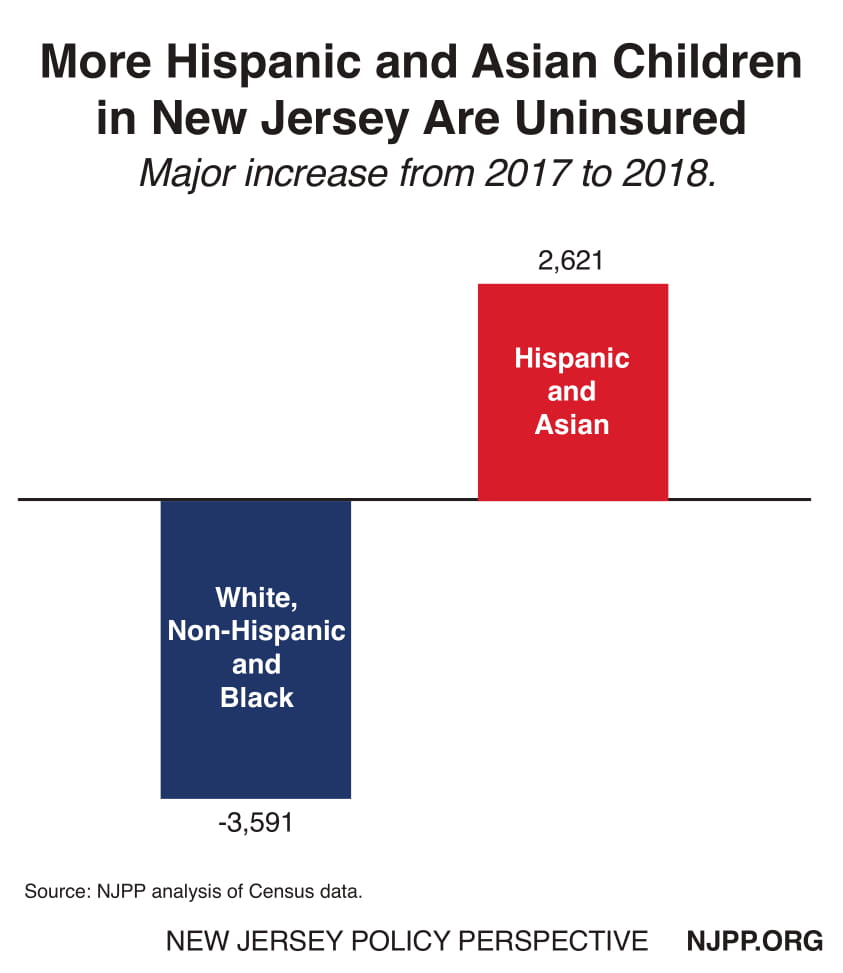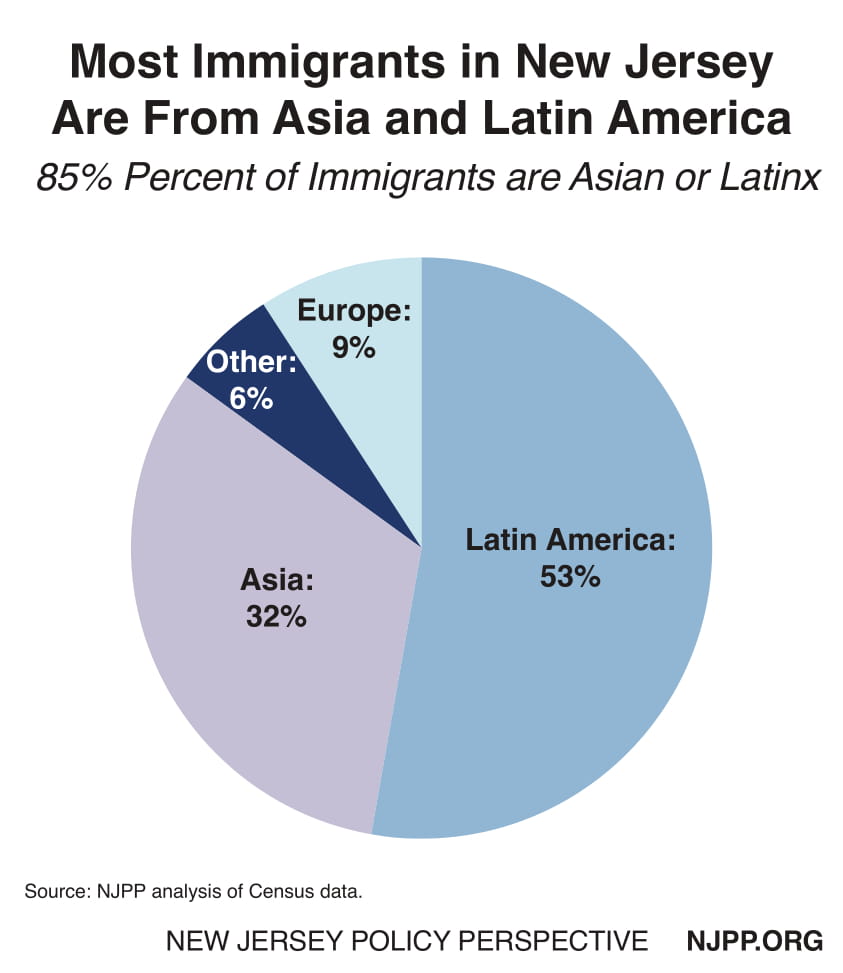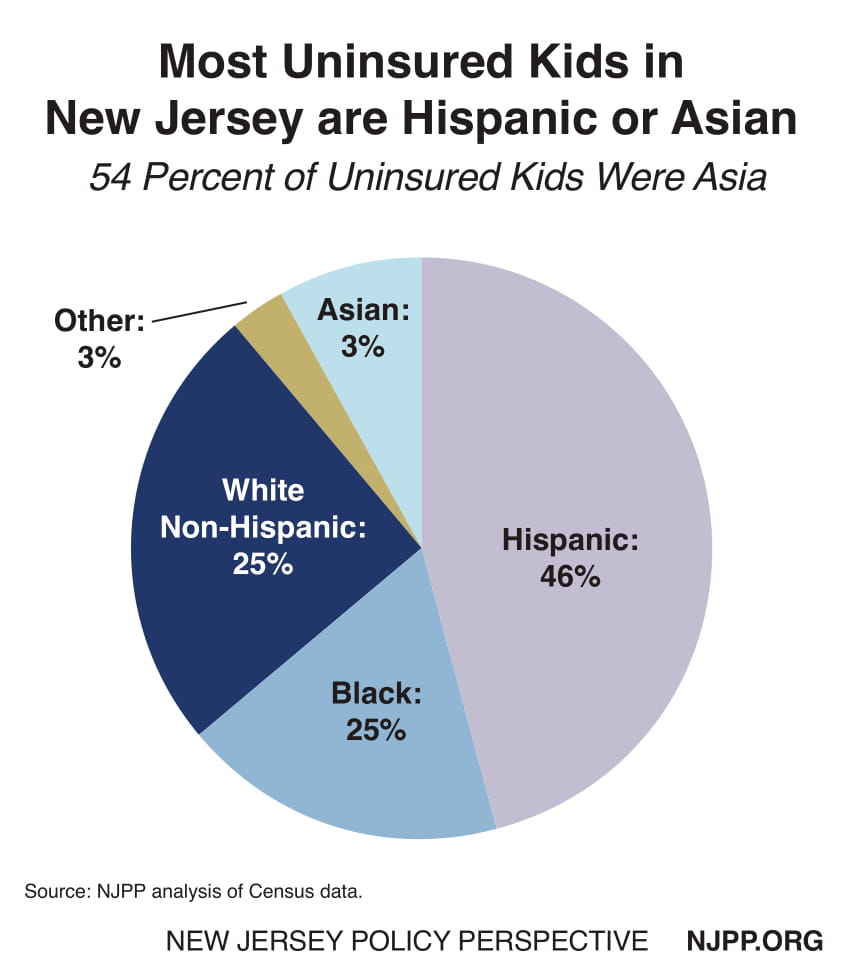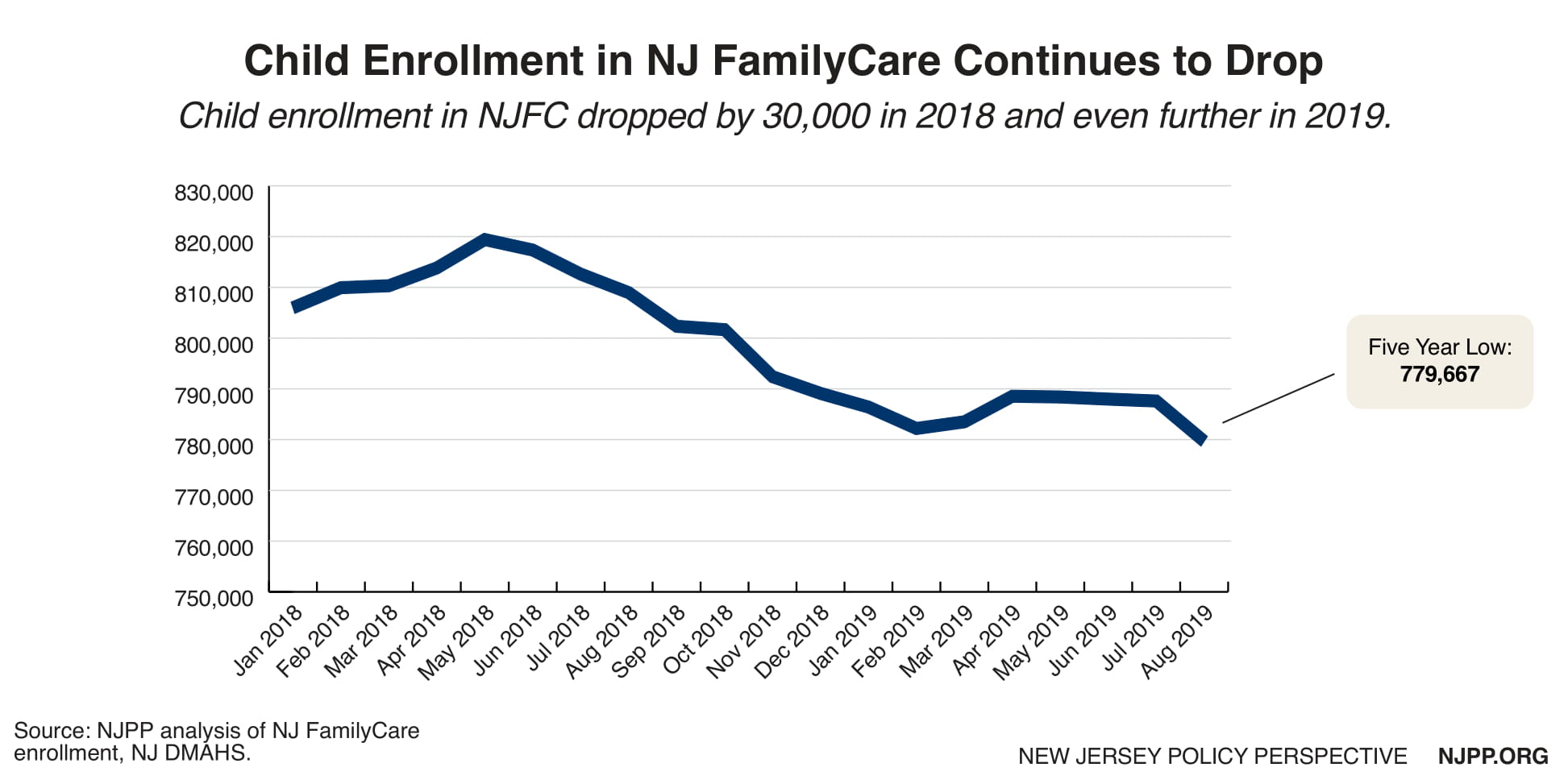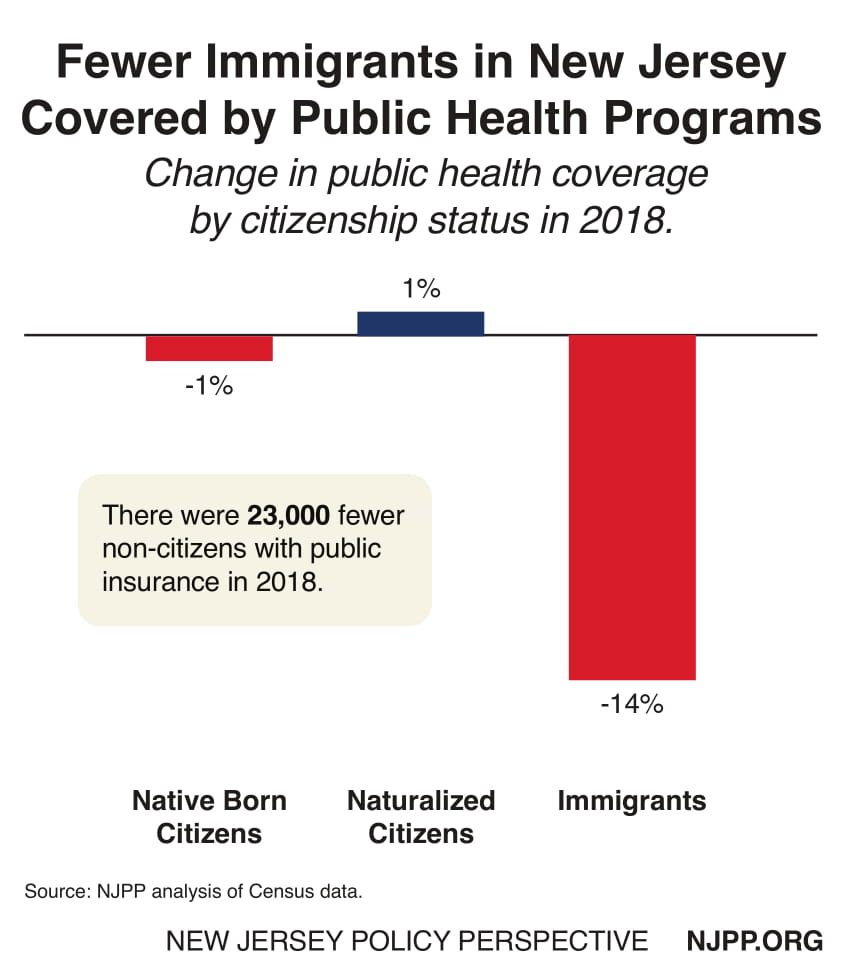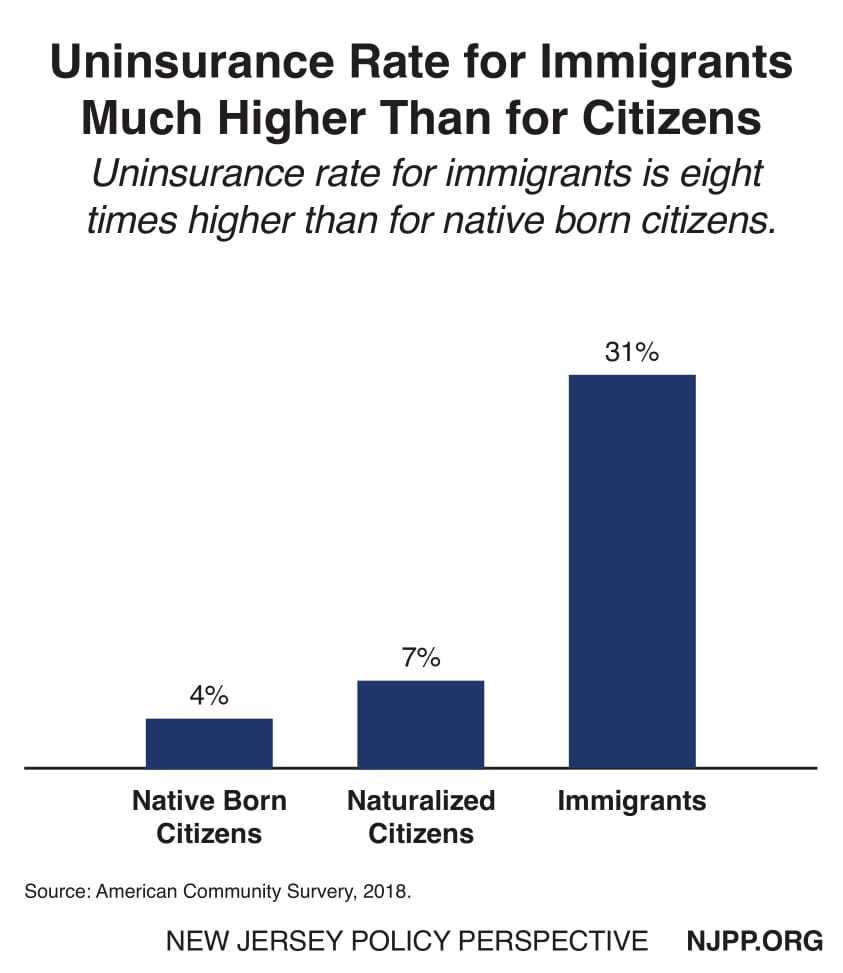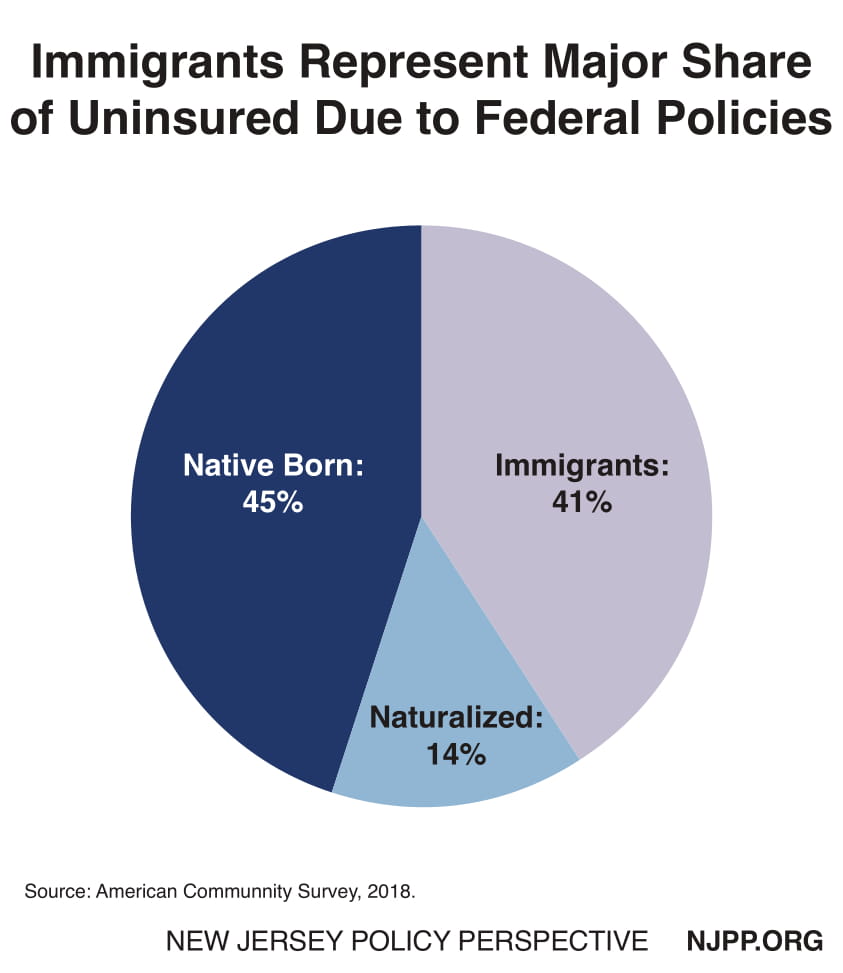To read a PDF version of the full report, click here.
The well-being of New Jersey families relies on their access to high-quality, affordable health coverage, which should be easy to obtain without fear. This is a challenge, however, for legal immigrants and citizens who live in mixed-status households (where at least one family member is undocumented) due to federal policies that penalize immigrants who enroll in NJ FamilyCare (NJFC). Last year, the Trump administration proposed an expansion to the “public charge” rule that would deny green cards and various visas to certain immigrants if they are enrolled or were deemed likely to enroll in a safety net program, including Medicaid. Despite the overwhelming public comments opposing the change, it was scheduled to take effect on October 15, 2019 until it was enjoined by multiple federal courts.
While the rule change has yet to be implemented, it has already had a chilling effect on legal immigrants and citizens in mixed-status households who are now dropping out of or not applying for public health coverage for fear of retribution. Last year, one in seven adults in immigrant families nationally reported that they or a family member did not enroll in a public benefit program because of the proposed public charge rule.[i] The new 2018 census data shows a steep increase in the number of uninsured Hispanic and Asian children in New Jersey, further demonstrating the enormous harm of anti-immigrant policies here in the Garden State.
More Uninsured Asian and Hispanic Children
Immigrant and citizen children in mixed-status households may have been harmed the most by the Trump administration’s anti-immigrant policies, especially as it concerns health coverage. Over the last year, there is a stark difference in the change in coverage for kids who are White or Black and kids who are Asian or Hispanic (Asian and Hispanic residents in New Jersey represent 85 percent of all immigrants).
While the total number of uninsured children remained about the same in New Jersey, it decreased by 3,591 for White and Black kids and increased by 2,621 for Asian and Hispanic kids. This is consistent with national trends as well. For example, the national uninsurance rate for Hispanic children increased significantly to 8.7 percent in 2018 from 7.7 percent in 2017.[ii]
Many children are harmed by the public charge rule even if it does not apply to them, as their parents do not always know this. The rule is complicated and strikes fear,[iii] which understandably has a chilling effect on many immigrant and mixed-status families. The chilling effect extends to children who are citizens as they can be living in households where another family member is an immigrant. The loss in health coverage for Hispanic and Asian kids is alarming because they already represent 54 percent of all uninsured children.
Historic Drop in Enrollment for Children in NJ FamilyCare
The increase in the number of uninsured Hispanic and Asian kids mirrors national trends and helps explain the major decrease in child enrollment in NJFC in 2018.[iv] Enrollment for children decreased by a startling 30,000 in 2018 from the peak of May to December. While the low unemployment rate during that time is a factor, researchers have concluded that the drop is too large to be explained by falling unemployment alone.[v] The new census data show that another cause is likely that parents are not enrolling their kids in or are dropping out of NJFC because of federal anti-immigrant policies that incite fear and mistrust among Hispanic and Asian families.[vi]
Drops in Enrollment Result in Lost Federal Funds and Higher Charity Care Costs
As result of this decrease in enrollment for kids, New Jersey is losing about $5 million in federal matching funds every month compared to the peak in May 2018.[vii] This will also have an economic impact because lost federal funds will result in lost jobs. Furthermore, hospitals are incurring $8.5 million in charity care costs to treat uninsured kids.[viii] This causes higher costs for taxpayers because part of charity care costs are reimbursed with federal and state funds. It also harms hospitals because the reimbursement they receive only defrays about half their full costs.[ix]
If Trends Continue, the Uninsurance Rate for Children Will Increase in 2019
Even more alarming, the decrease in enrollment for children is likely to be even greater in 2019 based on current NJFC enrollment trends. As of August 2019, enrollment decreased to 780,000, the lowest level in approximately five years. Thus, this problem will likely only get worse and could result in the total uninsurance rate for kids rising significantly in 2019 for the first time since the Affordable Care Act was implemented, just as it already did at the national level in 2018.
Public Health Coverage for Immigrants Decreased Sharply in 2018
The census also provides data on enrollment in all public health coverage programs based on citizenship for all New Jerseyans regardless of age.
Most likely this decrease is in NJFC because the only other large public health program is Medicare which has very stable enrollment. The percent of New Jerseyans with public health coverage remained about the same for native born and naturalized citizens but decreased by a startling 14 percent for immigrants. That meant there were 23,000 fewer immigrants enrolled in public health coverage in 2018 compared to 2017.
This decrease is particularly disturbing because immigrants already have the highest uninsurance rate compared to citizens in 2018 (31 percent vs 4 percent).
New Jersey has the third highest share of immigrants in the nation, and immigrants represent 41 percent of the state’s uninsured. This is the main reason why New Jersey scores near the national average in the uninsurance rate, in sharp contrast to other positive measures that New Jersey ranks very high in like median income and a low poverty rate. New Jersey can’t hope to become a top state in health coverage, much less achieve universal health coverage, without covering more immigrants.
Urgent Action Needed
Immigration policy may be set at the national level, but there are proactive steps the state can take to mitigate the harm caused by the Trump administration. Some of these actions have already been taken, such as the state opposing and suing the federal government on the proposed public charge rule. In addition, the state is expanding outreach for the marketplace starting November 1, 2019, which should help in enrolling more immigrants. Starting in 2021, the state will also take over all the operations of the marketplace, which has been run by the federal government.
It will be critical that the state develop targeted strategies to reach Asian and Hispanic immigrants. The state needs to improve outreach to make sure immigrants are fully aware of the proposed public charge rule, which is currently stuck in the courts. The rule will only directly affect a relatively small number of immigrants, but each immigrant will need to weigh the risks and benefits to themselves and their family in deciding whether they want to apply for NJFC and other safety-net programs.
To address this problem, the state should enact legislation that makes all children eligible for NJFC regardless of immigrant status and allocates outreach funding to organizations that have the trust of immigrants to reach and enroll more children in NJFC. Administrative barriers to enrollment in the Child Health Insurance Program (CHIP) portion of NJFC should be eliminated, like premiums which are the second highest in the country. In addition, the state requires that children must be uninsured for 90 days before they can be eligible for CHIP, a needless restriction that should also be dropped.
Taking proactive steps to insure all kids—regardless of where they were born—will make New Jersey’s children healthier and save the state money on charity care costs. New Jersey cannot afford not to enact these reforms.
End Notes
[i] Hamutal Berstein, et al, Avoiding Routine Activities Because Of Immigration Concerns, Urban Institute, July 24, 2019, https://www.urban.org/research/publication/adults-immigrant-families-report-avoiding-routine-activities-because-immigration-concerns
[ii] Joan Alker, Why Are There More Uninsured Children and What Can We Do About It? Georgetown University, September 12, 2019, https://ccf.georgetown.edu/2019/09/12/why-are-there-more-uninsured-kids-and-what-can-we-do-about-it/
[iii] Ibid 1, Berstein, et al
[iv] Georgetown University , Child Enrollment in Medicaid and CHIP, May 2019, https://ccf.georgetown.edu/wp-content/uploads/2019/09/Child-Medicaid-CHIP-Enrollment-Dec-2017-May-2019.pdf
[v] Matt Broaddus, Research Note: Medicaid Enrollment Decline Among Adults And Children Too Large To Be Explained By Falling Unemployment, Center On Budget and Policy Priorities, July 17, 2019, https://www.cbpp.org/research/health/research-note-medicaid-enrollment-decline-among-adults-and-children-too-large-to-be
[vi] Samantha Artiga, Estimated Impact Of Final Public Charge Inadmissibility Rule on Immigrants and Medicaid Coverage, September 18, 2019, https://www.kff.org/disparities-policy/issue-brief/estimated-impacts-of-final-public-charge-inadmissibility-rule-on-immigrants-and-medicaid-coverage/
[vii] Calculated based on estimates in Governor Murphy’s FY 2019 State Budget.
[viii] New Jersey Department of Health estimates per OPRA request, 2019.
[ix] New Jersey Hospital Association, 2018 Economic Activity Report, http://www.njha.com/media/541893/2018-Economic-Impact-Report.pdf

